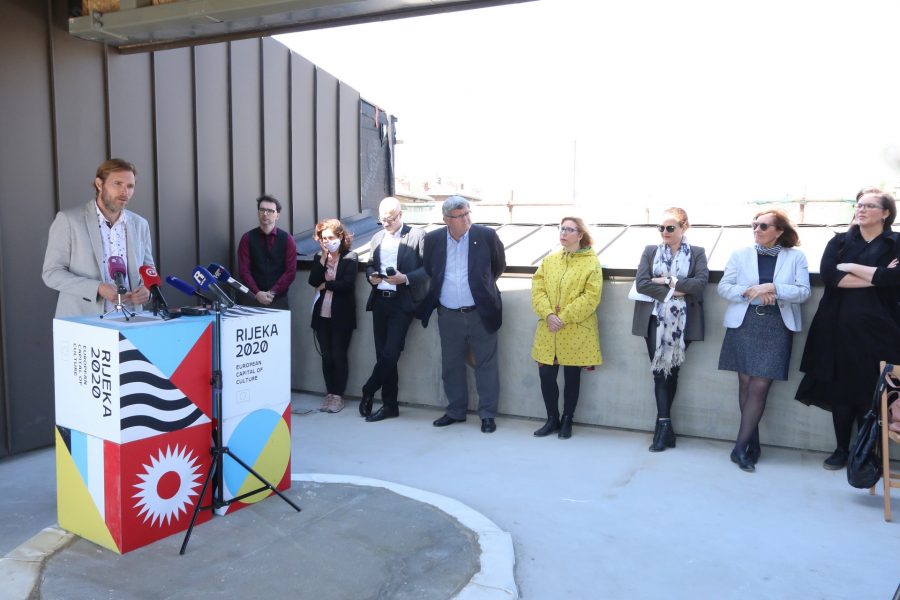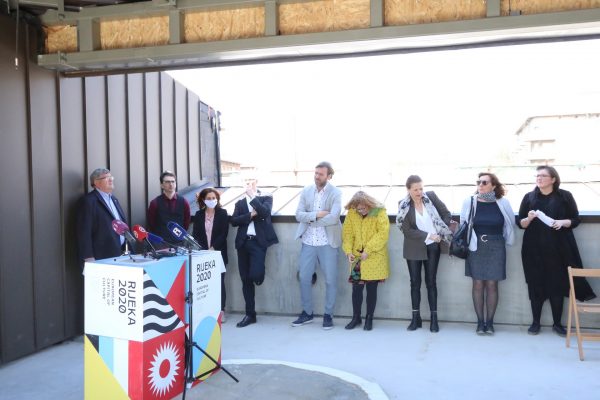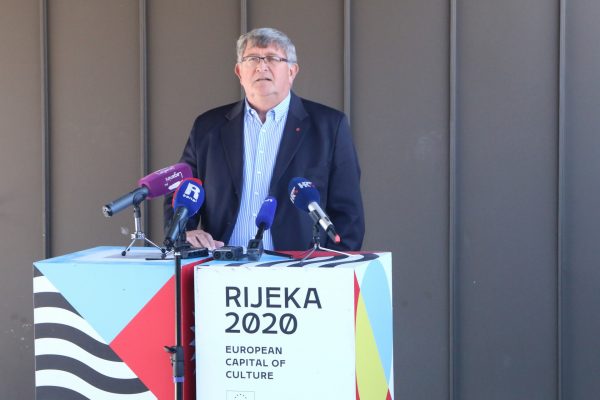
At a press conference that brought together numerous journalists, a cultural and artistic programme was announced to be held in Rijeka during May and June, coloured by measures of reduced social contacts and a ban on public gatherings.
The representatives of the city’s cultural institutions and the company Rijeka 2020, with the head of the Department of Culture Ivan Šarar and mayor Obersnel, met with the journalist on the roof of the future Children’s House in Rijeka, one of the buildings which construction is nearing completion – in the future cultural quarter of Rijeka “Rikard Benčić”.
– Both ECC and cultural programmes of all cultural institutions go on, in conditions of “the new abnormal” – said Ivan Šarar, head of the City’s Department of Culture.
Rijeka mayor, Vojko Obersnel pointed out: – the ECC project includes many cultural operators of this city, many artists and organisers, including all people who have gathered here today. It also includes the buildings that are emerging here, that in addition to many other things, will represent the heritage of this project.
As said, intensive activities are underway aimed at the creation of a cultural programme for this summer and at the creation of additional programme activities to celebrate, this autumn, the opening of the Mansion of the former sugar refinery as new premises of the Rijeka Civic Museum and the Children’s House.
Ballets without touch, concerts on construction sites, theatre in a time of distancing
The Croatian National Theatre Ivan Zajc included all its art ensembles in the programme, and during May, artists bring to the audience short video forms and will address “a new normality”, primarily social distancing that has separated the audience and the theatre and also performers themselves.
 The opera soloists of the CNT will now perform more famous opera arias and duets from their Rijeka repertoires of this and past few seasons, but in such a way that each duet poses in a different way the problem of “social distancing” of the opera performance. The Rijeka opera choir will perform “a capella” a variety of pieces, and members of the Rijeka Symphony Orchestra will hold and record five chamber concerts on the construction sites of the infrastructural facilities making part of Rijeka 2020 European Capital of Culture. The ballet ensemble brings ballet with a character – several micro choreographies: Contact forbidden, box, BoNet, Ballet glossary in the air and Lace 2. The Croatian Drama Ensemble will present several theatre performances that, due to the corona crisis, have been postponed for some time; “Vježbanje života-drugi put (Practicing Life for the Second Time)”, “Oedipus”, and ” Gospođa ministarka (Mrs. Minister)”, and will also remind us of the play that confronted Rijeka with itself “The Leica Format” and the musical “Evita”.
The opera soloists of the CNT will now perform more famous opera arias and duets from their Rijeka repertoires of this and past few seasons, but in such a way that each duet poses in a different way the problem of “social distancing” of the opera performance. The Rijeka opera choir will perform “a capella” a variety of pieces, and members of the Rijeka Symphony Orchestra will hold and record five chamber concerts on the construction sites of the infrastructural facilities making part of Rijeka 2020 European Capital of Culture. The ballet ensemble brings ballet with a character – several micro choreographies: Contact forbidden, box, BoNet, Ballet glossary in the air and Lace 2. The Croatian Drama Ensemble will present several theatre performances that, due to the corona crisis, have been postponed for some time; “Vježbanje života-drugi put (Practicing Life for the Second Time)”, “Oedipus”, and ” Gospođa ministarka (Mrs. Minister)”, and will also remind us of the play that confronted Rijeka with itself “The Leica Format” and the musical “Evita”.
Each performance will come to life in a specific and new way, in different locations in the theatre but also outside the theatre building, across Rijeka.

Mayor Vojko Obersnel
The drive in movie of the Art Cinema brings great cinematography and legendary film classics
The movie screen is being raised again at the Beretich parking lot in Rijeka, where a new edition of a drive in movie takes place in May, organized by the Art Cinema and the Filmaktiv association, under the auspices of Rijeka 2020 – European Capital of Culture. The programme will be free of charge but subject to obligatory prior reservation, for all visitors who, from the safety of their car, can once again enjoy the charms of the big screen. The drive in movie will be characterised by classic movies, while the programme at Beretich at 21:00 h, on Saturday 9 May will open the comedy drama “Dangube” (I Vitelloni, 1953 – The Slackers), by Federico Fellini, Italian maestro of cinema whose 100th anniversary of birth the “Art-cinema” marks with a full-year movie programme.
Next two Saturdays in May, May 16 and 23, the audience will be able to watch from their cars the masterpiece of the French new wave Breathless (À bout de souffle) by Jean-Luc Godard and the legendary western The Wild Bunch (1969) by Sam Peckinpah.
As in previous years, film sound will be received via the car radio, i.e. via the assigned radio frequency.
At the Croatian Cultural Centre the exhibition titled “Neizvjesna izložba/The Uncertain Exhibition” comments on the current situation and the new reality in which we live, while at the Museum of Modern and Contemporary Art the exhibition COVID19 addresses the same topic.
Through exhibition programmes at the Kortil Gallery, the programme is also implemented in May and June by the Croatian Cultural Centre Sušak. For the next exhibition, which opens at the end of May, the Kortil Gallery has invited artists from Rijeka and the Primorje-Gorski Kotar County to candidate their works that are marked by this moment in which we live, allude to it or anticipate it in some form unread so far. This exhibition, collectively known as the Uncertain Exhibition, will bring together the personal experience of this (new) moment and will provide commentary, reaction, or even response to the current situation and new reality in which we live. The artists invited to participate in the Covid19 exhibition at the Museum of Modern and Contemporary Art address the similar theme. The exhibition opens on May 20 and runs until July 31. The Museum of Modern and Contemporary Art opens its doors on May 12, with the continuation of the exhibition “S Kolekcijom/With the Collection” by David Maljković.
Book Recommendations, new creative technologies, Zoom Meetings of reading clubs
The Rijeka Civic Library has also opened its doors with the prescribed protection measures. On the two websites, “GKR Magazine” and “Brickzine”, the Rijeka Civic Library continues with publications and in May it brings the serial “AC labovanje” dedicated to new creative technologies in the form of “zoom”, conversations with renowned experts in the field of video and written educational materials on topics such as 3D print, VR, etc., and this content is also published online.
For children – stories and fairy tales, Brickzine and puppet shows in unusual outdoor locations
Brickzine.hr – online magazine of the Children’s House continues with the publication of its contents, bringing stories, recommendations, reviews, news on topics relevant to new growing, parents and children. In addition, online sites of the Children’s House are created on social networks and websites.
Actors and actresses of the Croatian National Theatre Ivan Zajc continue the programme dedicated to children by choosing four best and most famous stories of “Croatian Andersen”, Ivana Brlić Mažuranić. The tales for the youngest will also be performed by the actors of the Italian drama.
The Rijeka City Puppet Theatre continues its virtual programme and in May it brings titles such as The Dandelion’s Yellow Dance Dress, Snow White, Doctor Dolittle and The Ugly Duckling.
The novelty that puppetry in May brings to Rijeka is the programme titled “U lutkarsko s prozora / To puppetry from the window”. The audience can expect puppet interventions in unusual places in everyday life and outdoor performances in quarters, which children and adults will be able to follow from afar, i.e. from their window, respecting corona measures, namely from the prescribed distance, but also participating in the performances.
Interventions in space – a sculpture in Lovranska Draga, Baltazartown beach in Pećine, Baltazar’s Uragan (Hurricane)
At the beginning of April, one of the sculptures of the Lungomare Art programme directions was completed – piece by artist Davor Sanvincenti “Puli Mȁlin”, which can be visited while walking along the hiking trail in Lovranska Draga. Due to the specific position of the windows, interesting effects of the sun rays and water occur around the stone sculpture.
It is also envisaged that two more projects will be realised – in summer on the Grčevo beach in Rijeka, a Balthazartown beach will be created, where the Academy of Applied Arts of the University of Rijeka works, namely students under the mentorship of professor and artist Igor Eškinja, and on the Molo longo breakwater, with the same theme of Professor Balthazar, Balthazar’s Uragan (Hurricane) is being refurbished by authors’ studio Benussi & TheFish, where a series of temporary artistic interventions will turn the ship Uragan and the space around it into a new space for play, socialising and relax.
Short story writing competition as an introduction to FEKP and the Hay Literary Festival
During May, Rijeka 2020 announces a new Short Story Writing Competition for young authors. This competition is an introduction to this year’s European Short Story Writing Festival, which will also host the most famous European literary festival – the Hay Festival, with the theme “Visions for the Future”. Visions of the future are also a topic of the competition for young authors, who will certainly look back at a new normal in their “visions”, namely a pandemic that has changed many lives.
EU projects within the ECC programme
Towards the end of April, another festival in a series of neighbourhood festivals “The Winter Festival” in neighbouring Mrkopalj started. Within the programme, the Dutch collective Hoge Fronten prepared a series of performances in cooperation with the locals of Mrkoplje and the Croatian artist Tajči Čekada. Due to the corona virus the Hoge Fronten collective decided to perform a virtual live performance directed by Lieke Benders on the Zoom platform, available to Croatian and Dutch audiences at the same time. This program is co-produced by the Cultura Nova NL, and makes part of the European project called Centriphery.
As part of the Diversity Mixer project, which has been dealing with activities in culture and promoting diversity since 2018, the “Diversity preporuka/(Recommendations)” is being prepared, i.e. new criteria for public funding of culture and the creative industries, written in times of crisis, which further sharpened previously acquired insights – about the necessity of culture and the need for a different evaluation of its actors and ‘products’.

